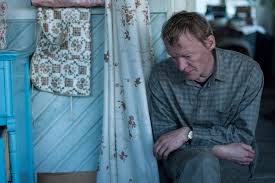Tags
Aleksei Serebryakov, Andrey Zvyagintsev, Charisse Gendron, cinema, Elena, Elena Lyadova, film, Mikhail Krichman, Roman Madyanov, Russian cinema, Sergey Pokhodaev, Vladimir Vdovichenkov, world cinema
 In extreme states brought on by one or the other’s villainy, alcoholism, hypocrisy, adultery, or death, the characters in Leviathan talk, rage, and whisper about faith and reason, guilt and forgiveness, love and suffering. Simultaneously with these conversations, the film’s extraordinary cinematography, by Mikhail Krichman, of a peninsula by the Barents Sea, with its wild shoreline, monumental whale skeleton, and ruined church, tells a riddling story of human beings struggling with monsters of oceanic proportions.
In extreme states brought on by one or the other’s villainy, alcoholism, hypocrisy, adultery, or death, the characters in Leviathan talk, rage, and whisper about faith and reason, guilt and forgiveness, love and suffering. Simultaneously with these conversations, the film’s extraordinary cinematography, by Mikhail Krichman, of a peninsula by the Barents Sea, with its wild shoreline, monumental whale skeleton, and ruined church, tells a riddling story of human beings struggling with monsters of oceanic proportions.
Who or what is the antagonist in Zvyagintsev’s contemporary tale of Job? The mayor, Vadim (Roman Madyanov), contends most strenuously for this role, as he pries away the family home from Kolya (Aleksei Serebryakov), a blameless car mechanic. Vadim, whose whims will not be denied, primes his flunky judges to reject Kolya’s successive appeals to keep his land, as Kolya grows increasingly maddened by the mayor’s greed and his own impotence before the corrupt legal system.
But the mayor and his court have rivals in deviltry in the priest and his Orthodox Church—not the decaying chapel where the boys gather, but a fancy place tricked out in satin and gold. Even the vicious but devout Vadim occasionally doubts himself and turns to God’s servant to guide him. Presiding over a sumptuous table, the priest cites technical reasons for refusing to hear the mayor’s confession and promises not to interfere in the worldly affairs of a defender of the faith.
Neither does reason escape culpability for human suffering. Kolya calls on his army friend Dmitriy (Vladimir Vdovichenkov), now a smart city lawyer, to help him win his case. Dmitriy digs up plenty of mud on the mayor, which he threatens to bring back to Moscow if the court does not desist. Yet, by believing that the facts will triumph over lies, Dmitriy only proves the inefficacy of the human intellect to prevent tragedy. After his near assassination by Vadim’s minions, he leaves town, but not before starting an affair with Kolya’s sad and emotionally exhausted wife, Lilya (Elena Lyadova).
Returned home to Kolya and his hurting adolescent son, Roma (Sergey Pokhodaev), a penitent Lilya stands by the sea, watching a whale breach the waves. Shortly afterward, she disappears. Though it heralds yet another bitter affliction for Kolya, however, the whale is not to be confused in simple fashion with the leviathan of the film’s title. In the form of the giant skeleton on the beach, the whale also aligns with the shell of the old church; with Kolya’s home as it succumbs to the wrecking ball; and with the stricken man himself, to suggest a different order from that inhabited by the mayor, the priest, and the humanist lawyer: An order in which God is not absolved from tragedy.


I was so looking forward to see Leviathan this year, but I missed it, I have to wait until it comes out of DVD.
I thought you must have missed it when I didn’t see it on your list, Karzan! I think you will appreciate it–but sad that you have to see it on the small screen. It is playing in theaters in NYC. . .